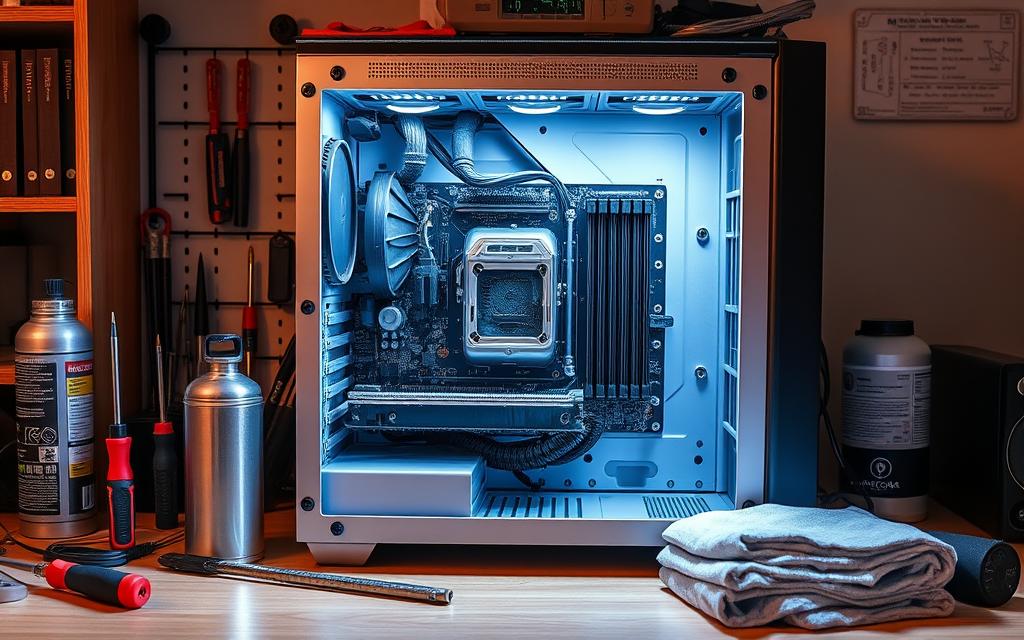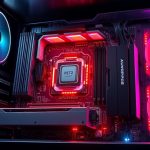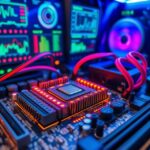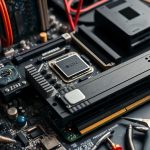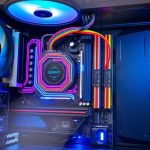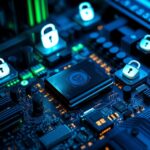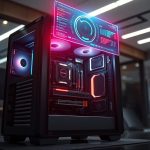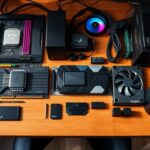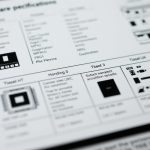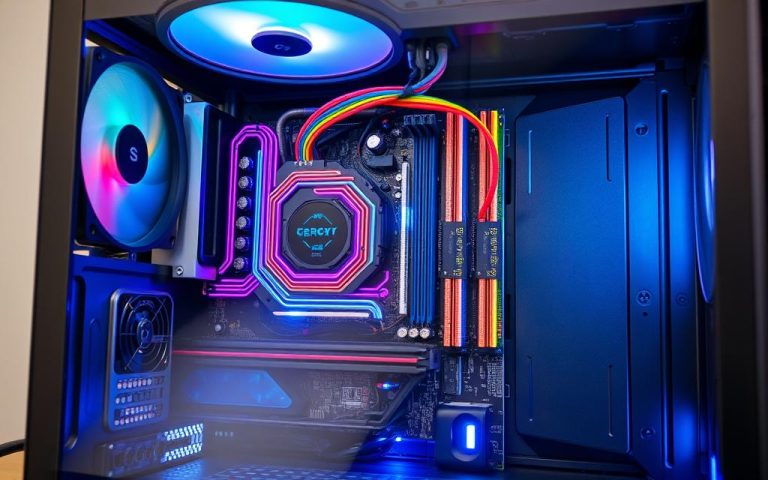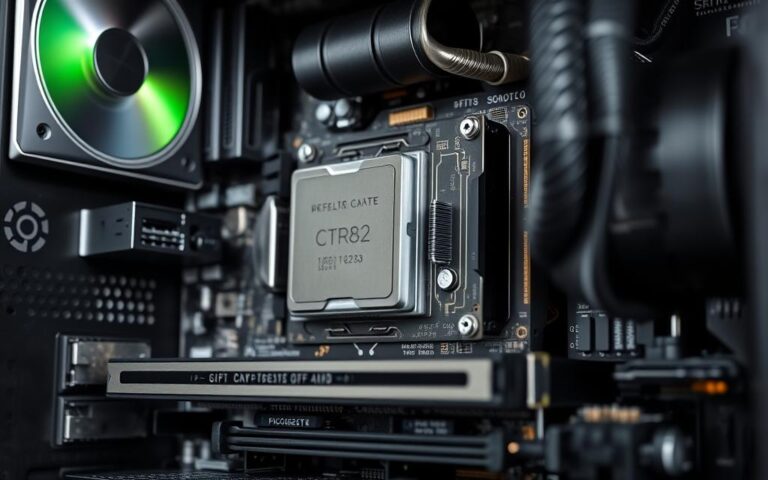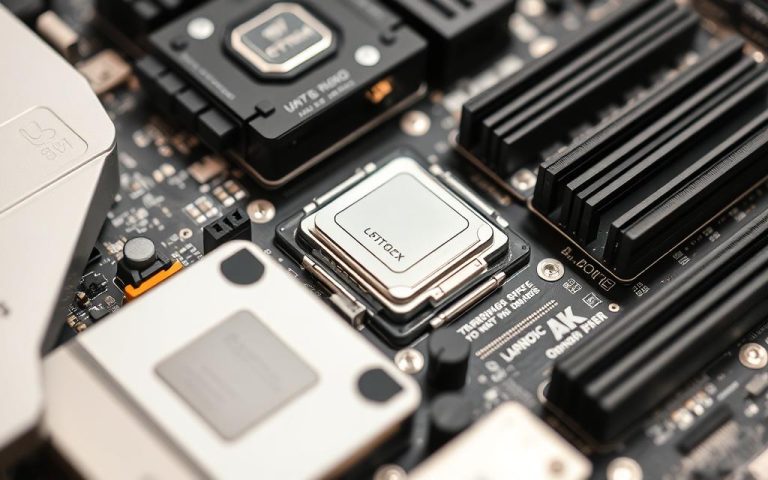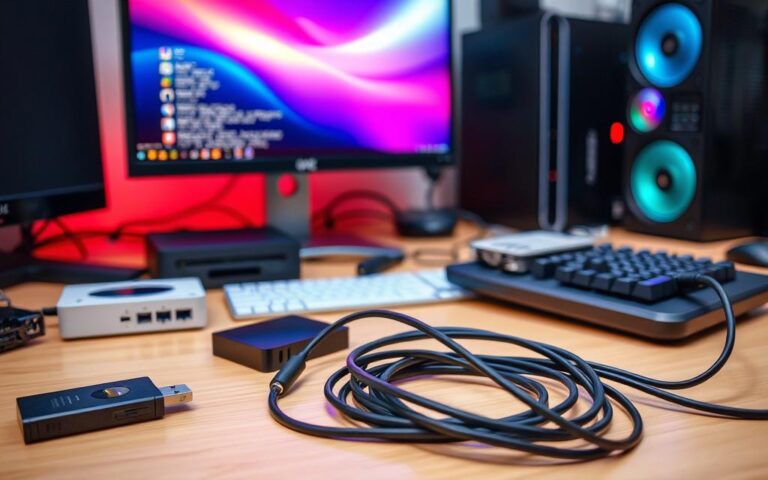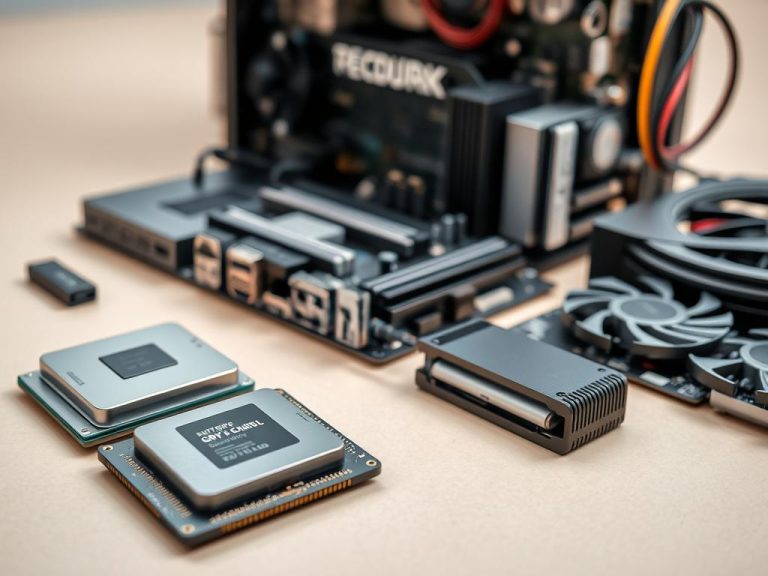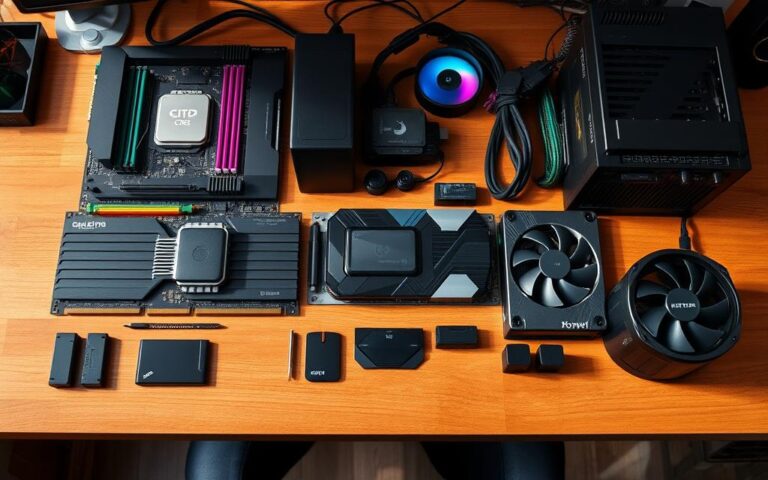How to Protect Your Computer Hardware: Tips for Longevity
Keeping your computer in top shape is key to its smooth operation. By protecting your hardware, you avoid costly repairs and extend its life. Simple tasks like cleaning, updating software, and managing cables are vital.
Good computer care means protecting your hardware and keeping software up to date. This includes tasks like defragmenting your hard drive and updating your system. These actions boost your computer’s performance, free up space, and improve security. Using reliable antivirus software and keeping it updated can cut down malware risks by 70%.
Knowing how to protect your computer’s hardware is essential. A well-cared-for computer can last five to eight years. By sticking to a maintenance routine, you can add three to five more years to its life. Prioritising hardware protection and regular maintenance ensures your computer works well, securely, and efficiently.
Understanding Your Computer Hardware Components
To keep your laptop care and desktop maintenance in top shape, knowing your system’s parts is key. This includes the CPU, motherboard, and RAM inside, and the keyboard, mouse, and monitor outside.
Buying new computers and gadgets often costs a lot and harms the environment. By looking after your laptop care and desktop maintenance, you can make your computer last longer. This also cuts down on electronic waste.
Essential Internal Components
The motherboard is at the heart of your computer, holding CPUs, RAM, and more. The power supply is also vital, providing power to all parts of the system.
External Hardware Elements
Parts like the keyboard, mouse, and monitor are key too. Keeping them clean and checked regularly is part of good laptop care and desktop maintenance.
Identifying Vulnerable Parts
Knowing which parts, like the hard drive and power supply, are at risk helps you protect them. Understanding how each part works and how they fit together is key to keeping your computer safe.
By following the right laptop care and desktop maintenance steps, you can make your computer last longer. This means you won’t need to replace it as often.
The Importance of Physical Protection
Physical protection is key for hardware protection. It stops damage from theft, accidents, and natural disasters. To keep your computer hardware safe, use protective cases, sleeves, and bags. Also, manage cables well to avoid damage to ports and connectors.
A tidy workspace lowers the risk of accidents and spills. Stay away from smoking and eating/drinking near your computer. This prevents damage from smoke and spills. For more on physical security, check out physical security guidelines.
Some important steps to protect your computer hardware include:
- Use locks and access controls to keep it safe from unauthorized access.
- Install surveillance and monitoring systems to spot threats early.
- Back up your data regularly to avoid losing it in case of theft or damage.
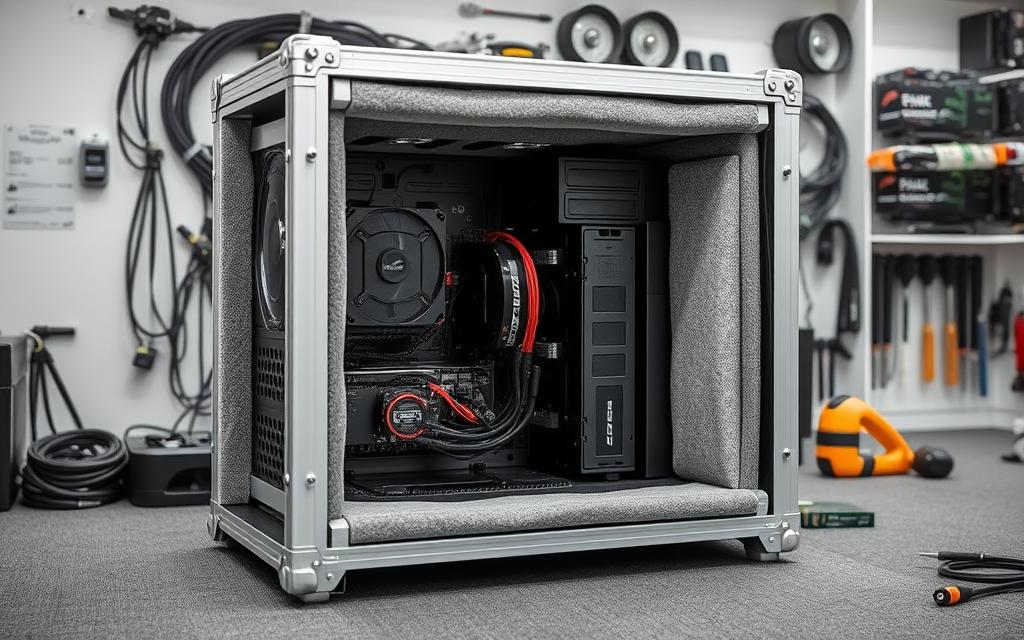
By following these steps, you can keep your computer hardware safe from harm. Always be careful with your computer to avoid accidents and spills.
| Measure | Description |
|---|---|
| Locks and access controls | Prevent unauthorized access to your computer hardware |
| Surveillance and monitoring systems | Detect and prevent damage from threats |
| Regular backups | Save your data from loss in case of theft or damage |
How to Protect Computer Hardware from Environmental Threats
Things like temperature, humidity, and dust can harm your computer’s lifespan. It’s key to keep the temperature and humidity right in your workspace. Also, doing disk cleanup and software updates regularly helps your system run better and last longer.
A clean computer is less likely to overheat. This can damage the inside parts. Keeping your software current also guards against threats. For instance, using a modern browser like Microsoft Edge blocks harmful websites and stops malicious code.
To shield your computer from these dangers, follow these tips:
- Place your computer in a cool, airy spot to avoid overheating
- Use a surge protector to safeguard against power spikes
- Clear out dust from your computer’s vents and fans often
| Environmental Threat | Protection Measure |
|---|---|
| Temperature | Keep the computer in a well-ventilated area |
| Humidity | Use a dehumidifier to control humidity levels |
| Dust | Regularly clean the computer’s vents and fans |
By following these steps, you can protect your computer from environmental harm. Regular software updates and disk cleanup also prevent hardware issues. This keeps your computer running smoothly and efficiently.
Power Protection and Surge Defence
Looking after your laptop means keeping it safe from power issues. A good surge protector can stop damage from too much energy. Experts say always unplug your laptop when not in use to keep the battery healthy and avoid overheating.
Understanding surge protectors is key to power protection. They have special parts that handle surges, protecting your devices. When picking a surge protector, check for UL certification to ensure it meets safety standards. For more tips on protecting your devices, visit power protection guides.
When choosing a surge protector, look at its electrical rating and suppressed voltage rating. Lower ratings mean better protection. It’s vital to use surge protectors in places with lots of electrical storms or in rural areas. Here are some benefits:
- Protects against power surges and spikes
- Prevents damage to electronic devices
- Extends the life of your battery
- Prevents overheating
Protecting your computer from power threats keeps it running well. Replace your surge protector if it’s damaged. Consider a high-quality surge protector for computers, which costs between $40 to $100.
| Surge Protector Feature | Importance |
|---|---|
| UL Certification | Ensures safety standards are met |
| Electrical Rating | Indicates power capacity |
| Suppressed Voltage Rating | Provides better protection with lower ratings |
Essential Cleaning and Maintenance Routines
Keeping your computer clean is key to avoiding damage. Regular maintenance helps your computer work better and last longer. It’s important to protect your hardware to keep your device in top shape.
Many people forget the importance of maintenance. It includes cleaning and keeping devices cool. Start by cleaning your keyboard and mouse each week. Also, check your fans and vents every month.
Weekly Maintenance Tasks
- Clean the keyboard and mouse
- Inspect the fans and vents for dust buildup
- Check for loose connections and secure them
Monthly Hardware Checks
- Inspect the computer’s interior for dust and debris
- Check the hard drive for errors and defragmentation
- Update software and drivers to ensure compatibility
Regular maintenance keeps your computer dust-free and cool. This is vital for its performance. It’s a big part of keeping your desktop in good shape.
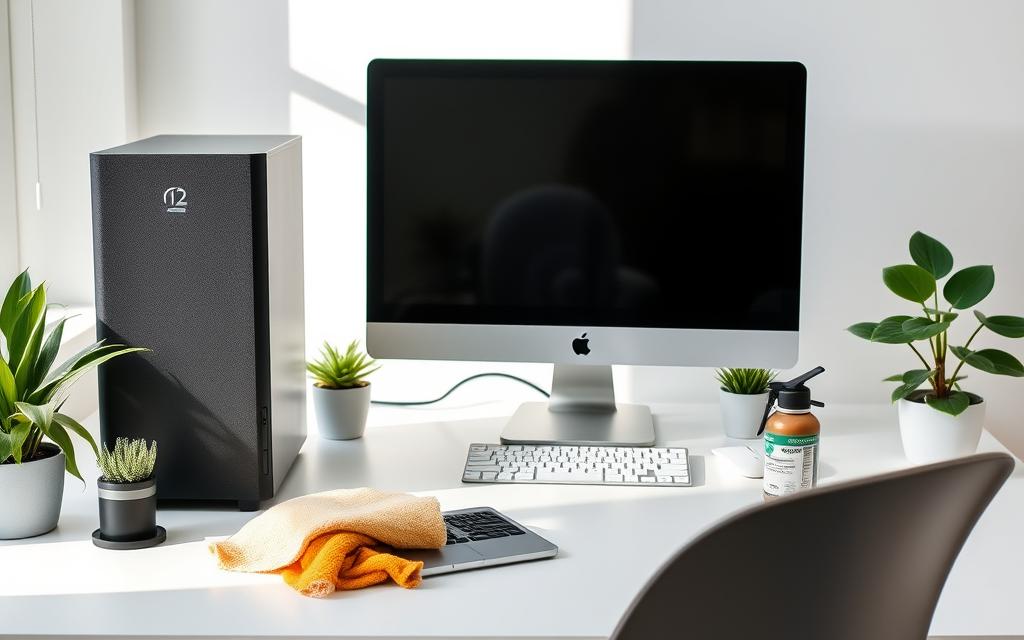
Deep cleaning your computer once a year is also important. It helps prevent damage and keeps your system running well. Regular cleaning and maintenance ensure your computer stays reliable and efficient.
| Maintenance Task | Frequency |
|---|---|
| Clean keyboard and mouse | Weekly |
| Inspect fans and vents | Monthly |
| Deep clean computer interior | Annually |
Protecting Against Physical Damage and Wear
Physical damage and wear can harm your computer’s lifespan. It’s key to handle it right and store it well. For example, using a protective case for your laptop can shield it from harm. Also, keeping your computer in a cool, dry spot can stop overheating and moisture problems.
Good cable management is vital to avoid damage to ports and connectors. Cable ties and organizers keep your cords neat, lowering damage risks. Plus, keeping your software up to date guards against cyber threats and keeps your system running well.
- Be gentle with your laptop to avoid drops and bumps
- Keep your computer in a cool, dry spot, away from sunlight
- Use a surge protector to protect against power issues
- Regularly clean your computer’s vents and fans to avoid dust
By following these tips, you can keep your computer running smoothly and extend its life. Stay alert and maintain your computer regularly. Neglect can seriously harm your computer’s hardware.
Software Solutions for Hardware Protection
Keeping computer hardware safe and working well needs a mix of physical protection, controlling the environment, and using software. Doing disk cleanup and defragmentation regularly is key. These actions help avoid losing data, make systems run better, and lower the chance of hardware damage.
More and more people now know how important it is to use security products to guard their computers. This shows a growing concern for online safety. Keeping software updated and using antivirus can stop many cyber threats. In fact, 83% of data breaches could be avoided with the latest security patches, and 60% of computers are at risk without antivirus.
To protect computer hardware, users can take several steps, including:
- Regularly updating software and operating systems to prevent security vulnerabilities
- Performing disk cleanup and defragmentation to maintain system performance
- Installing antivirus software to prevent malware infections
- Implementing strong password policies to prevent unauthorized access
By taking these steps and using software solutions, users can safeguard their computer hardware. As the third source advises, “Update software & perform regular maintenance. If you are running Windows, make sure you install Windows Updates weekly.” This is very important today, as cyber threats are getting more common.
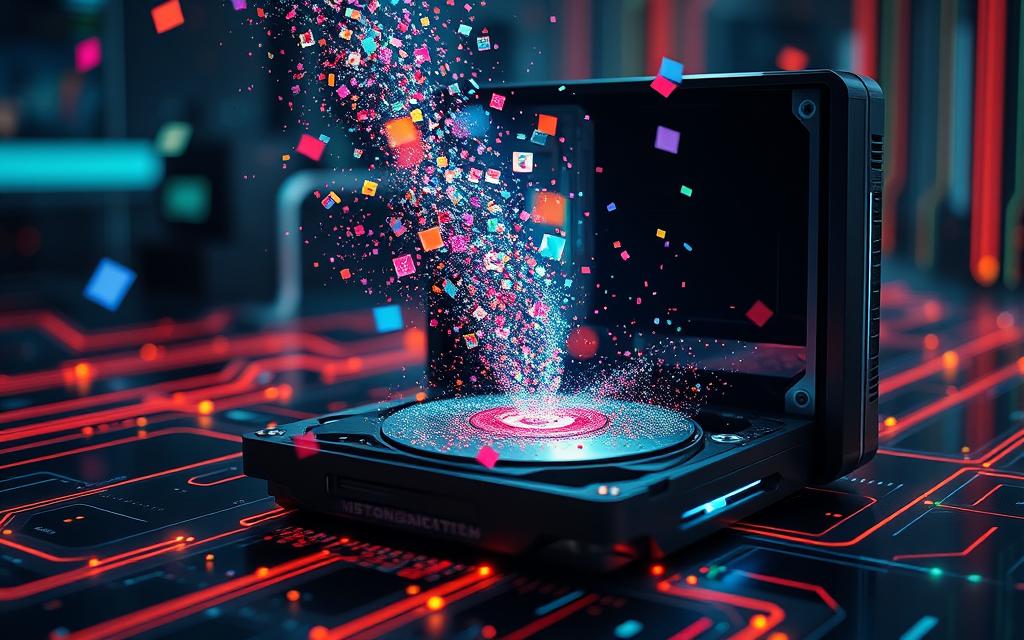
By focusing on software solutions for hardware protection, users can prevent data loss, enhance system performance, and lower the risk of hardware failure. Whether through regular disk cleanup and defragmentation or strong security measures, software is vital in safeguarding computer hardware and ensuring it lasts longer.
Professional Maintenance: When to Seek Expert Help
Keeping your computer hardware in good shape is key to its longevity and performance. Sometimes, you’ll need to call in the experts. Spotting signs like odd noises or error messages early can help fix issues before they get worse.
For laptop care, keep an eye on disk usage and update your system regularly. Also, check for hardware errors and security issues. This way, you avoid failures and keep your network running smoothly.
Choosing skilled technicians for hardware protection ensures your computer is fixed right and fast. Here’s why getting professional help is a good idea:
- Quick and effective data recovery solutions in case of a cyber incident
- Customized security solutions tailored to specific business needs
- Advanced malware detection and audits to identify and address weaknesses swiftly
- Experienced technicians providing reliable support and solutions for complex technical challenges
Getting expert help can extend your computer’s life and save you from expensive fixes. Regular care and spotting warning signs early can prevent many issues. This way, you can fix problems before they get out of hand.
| Maintenance Type | Description |
|---|---|
| Condition-based maintenance (CBM) | Performed after indicators of possible failure are detected |
| Corrective maintenance | Done to rectify faults and restore equipment to operational condition |
| Planned preventive maintenance (PPM) | Scheduled to prevent breakdowns and downtime |
Conclusion: Maximising Your Hardware’s Lifespan
Protecting and maintaining your computer hardware is key to its long life and top performance. But, upgrading to newer tech is sometimes needed. Upgrading your computer hardware brings many benefits. These include better processing, security, and energy use.
Getting the latest hardware components boosts your productivity and work flow. It also means your system can run smoothly with new software. Plus, you get strong security features, giving you peace of mind.
While upgrading might cost at first, it saves money and boosts performance in the long run. It’s a wise choice for both businesses and individuals.
Don’t forget, keeping your computer in good shape is vital. Regular computer maintenance and watching your hardware’s health are musts. Stay ahead with new tech and work with experts to keep your hardware running smoothly, now and in the future.
FAQ
What are the essential internal components of a computer?
The key parts inside a computer are the CPU, motherboard, and RAM.
What are the external hardware elements that need to be protected?
You should protect the keyboard, mouse, and monitor. These are the parts outside the computer.
How can I identify vulnerable parts in my computer?
To spot weak spots, learn how each part works and how they connect. Watch out for the hard drive and power supply. They’re easy to damage.
Why is physical protection important for computer hardware?
Using cases and managing cables helps avoid scratches and drops. It keeps your computer safe.
How can I protect my computer hardware from environmental threats?
Keep your workspace cool and dry. Clean and dust regularly to protect your computer.
Why is power protection important for my computer hardware?
A good surge protector and power management stop damage from power issues. It keeps your computer safe.
What are the key cleaning and maintenance routines I should follow?
Clean your keyboard and mouse weekly. Check your hardware monthly and deep clean yearly. This stops dust and overheating.
How can I protect my computer hardware from physical damage and wear?
Carry your laptop in a case and store it safely. This prevents damage and wear.
How can software solutions help protect my computer hardware?
Update your system and software regularly. Clean and defragment your disk often. This protects your hardware.
When should I seek expert help for my computer hardware?
If you see strange noises or error messages, get help from a computer repair expert. They can fix the problem.
